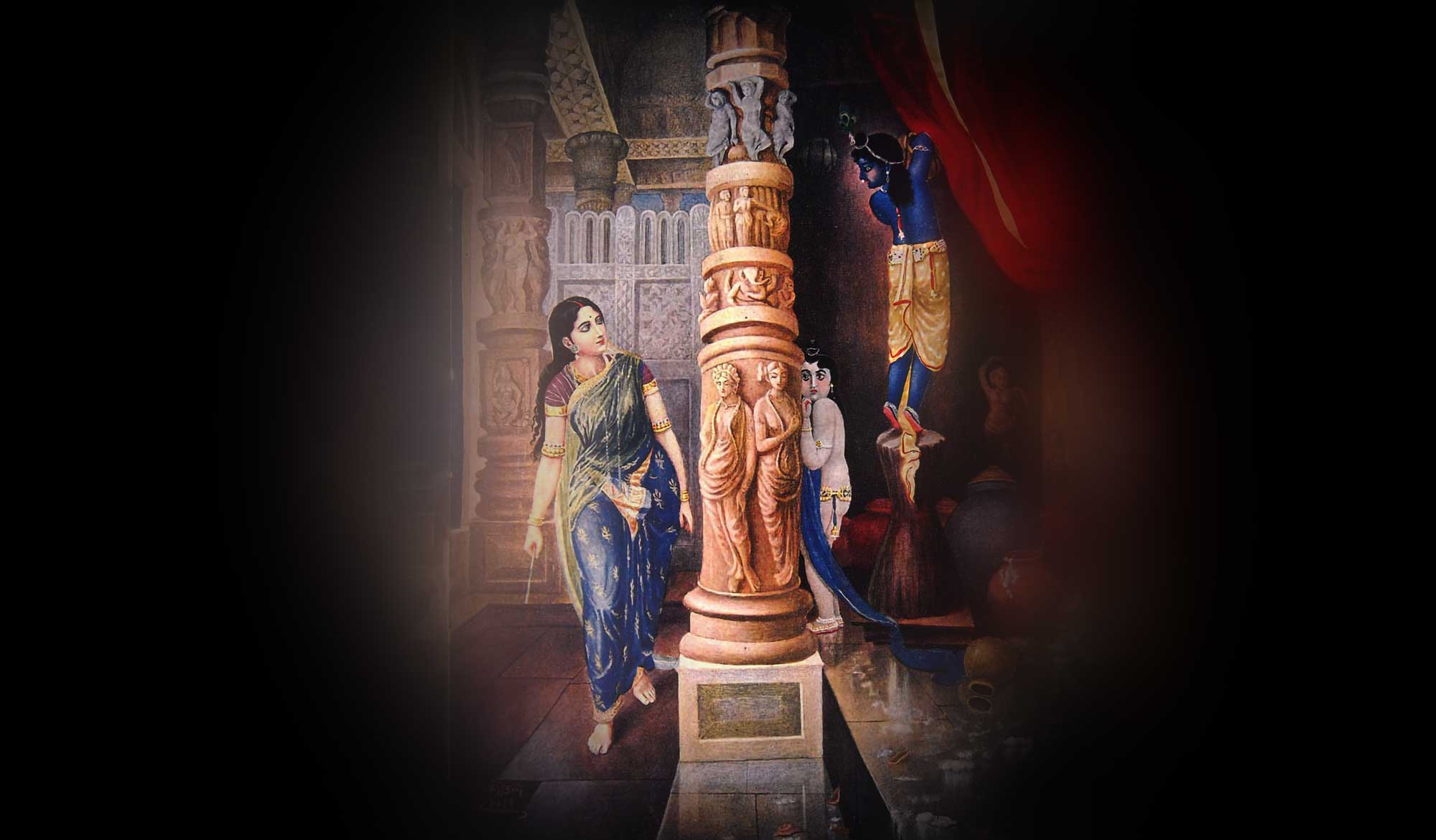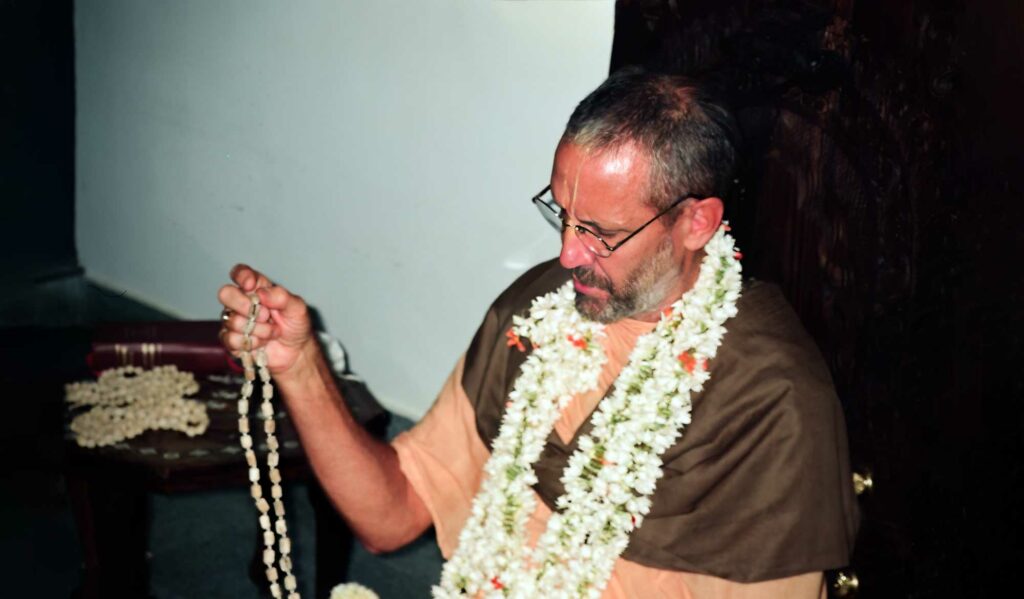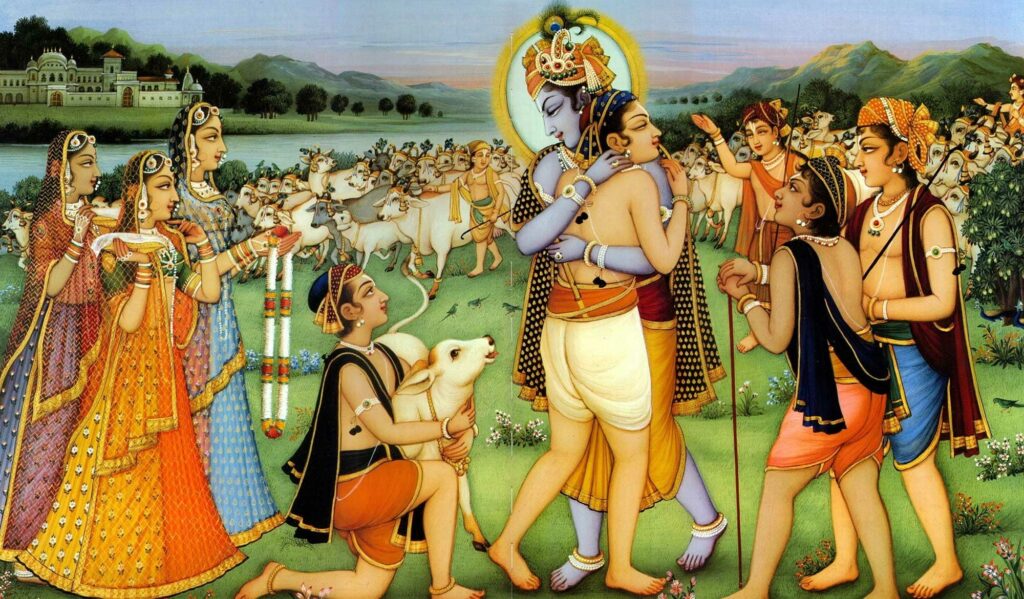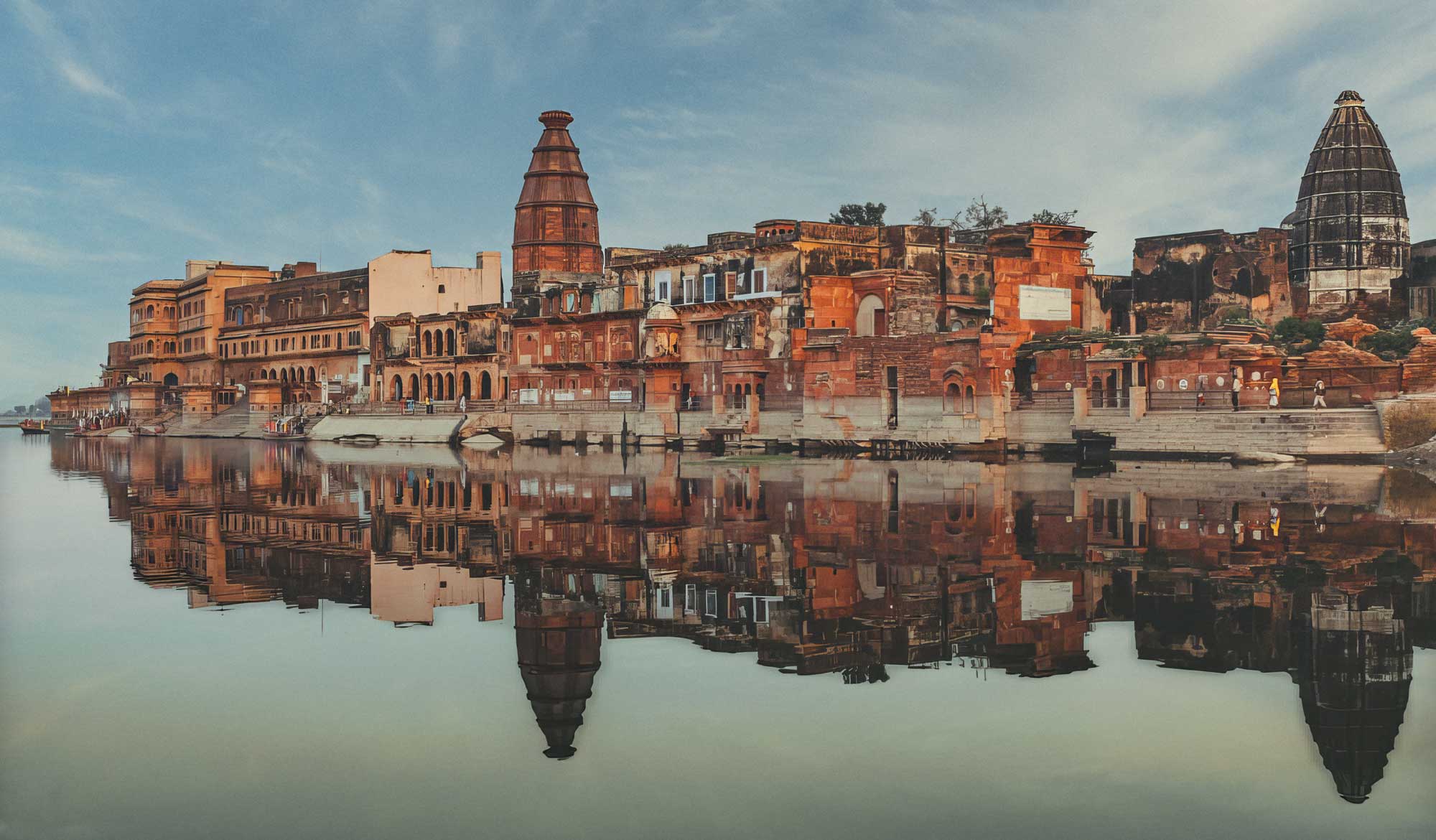Overview
Śrīla B.R. Śrīdhara Deva Gosvāmī comments upon a Sanskrit prayer attributed to Śrī Bilvamaṅgala Ṭhākura entitled Caurāgragaṇya-Puruṣāṣṭakam (Eight Prayers to that Personality Who is the Best of Thieves). In his explanation, Śrīla Śrīdhara Mahārāja explains that Kṛṣṇa’s inherent nature as a thief is in the jīva’s best interests.
(1)
vraje prasiddhaṁ nava-nīta-cauraṁ
gopāṅganānāṁ ca dukūla-cauram
aneka-janmārjita-pāpa-cauraṁ
caurāgragaṇyaṁ puruṣaṁ namāmi
He who is famous in Vraja as He who steals fresh butter, who steals the clothes of the cowherd damsels, who steals the sins that a one attains over many lifetimes – I offer respects unto that best of thieves.
(2)
śrī-rādhikāya hṛdayasya cauraṁ
navāmbuda-śyāmala-kānti-cauram
padāśritānāṁ ca samasta-cauraṁ
caurāgragaṇyaṁ puruṣaṁ namāmi
He who steals the heart of Śrī Rādhikā, who steals the lustre of a freshly blossomed dark blue lotus, who steals everything from those who take refuge at His feet – I offer respects unto that best of thieves.
(3)
akiñcanī-kṛtya padāśritaṁ yaḥ
karoti bhikṣuṁ pathi geha-hīnam
kenāpy aho bhīṣaṇa-caura īdṛg
dṛṣṭaḥ śruto vā na jagat-traye ‘pi
He makes those who take shelter at His feet into paupers. He takes away one’s home and turns one into a beggar. Indeed, such a terrible thief has never been seen or heard of in the three worlds!
(4)
yadīya nāmāpi haraty aśeṣaṁ
giri prasārān api pāpa-rāsīn
āścarya-rūpo nanu caura īdṛg
dṛṣṭaḥ śruto vā na mayā kadāpi
His Name immediately removes unlimited sins, even if they are as huge as a mountain. Indeed, I have never seen or heard of such a wonderful Thief as this!
(5)
dhanaṁ ca mānaṁ ca tathendriyāṇi
prāṇāṁś ca hṛtvā mama sarvam eva
palāyase kutra dhṛto ‘dya caura
tvaṁ bhakti-dāmnāsi mayā niruddhaḥ
You have taken my wealth, my honour, my senses, my life, my everything by force! Now that I have caught You, where will You run to, O thief? I have captured You with the rope of bhakti.
(6)
chinatsi ghoraṁ yama-pāśa-bandhaṁ
bhinatsi bhīmaṁ bhava-pāśa-bandham
chinatsi sarvasya samasta-bandham
naivātmano bhakta-kṛtaṁ tu bandham
You may slash the terrible noose of Yamarāja, You may cut the dangerous bonds of the material world, and You may easily sever everyone’s mundane bondage, but You cannot cut the ropes that bind You made by Your very own devotees.
(7)
man-mānase tāmasa-rāśi-ghore
kārā-gṛhe duḥkha-maye nibaddhaḥ
labhasva he caura hare cirāya
sva-caurya-doṣocitam eva daṇḍam
I have imprisoned You within the dark and extremely terrible dungeon of my mind which is full of miseries. O thieving Hari! Always kindly award me a befitting punishment for my own crimes of theft.
(8)
kārā-gṛhe vasa sadā hṛdaye madīye
mad-bhakti-pāśa-dṛḍha-bandhana-niścalaḥ san
tvāṁ kṛṣṇa he! pralaya-koṭi-śatāntare ‘pi
sarvasya caura hṛdayan nahi mocayāmi
You will eternally reside within the prison of my heart and You will be rendered completely immobile, bound by the fetters of my devotion. O Kṛṣṇa! Even after millions of universal annihilations, I will never release you from my heart, O stealer of everything!
ILLUMINATION
By Śrīla Śrīdhara Deva Gosvāmī Mahārāja
There are eight ślokas where Kṛṣṇa is called caurāgragaṇyaṁ puruṣaṁ – “You are a thief of the first order. You are the thief of thieves and I bow down to You.” What sort of thief? Vraje prasiddhaṁ nava-nīta-cauraṁ – while You were living in Vṛndavana, You were notorious as a butter-stealer. The gopīs prepared butter from milk and Your habit was to steal that butter from almost every house. You are notorious for that. Gopāṅganānāṁ ca dukūla-cauram – and is it not You that stole the dress of the gopīs while they were taking their bath in the Yamunā River? They were keeping their dresses on the shore, and You took all those dresses and went up a tree. You are famous for that. So shamefully You can steal the dresses of the gopīs! You are sarvasya-cauram (the stealer of everything), and You steal everything from the hearts of those that are saints. The sādhus come to worship You and You steal the heart from their bodies. Caurāgragaṇyaṁ puruṣaṁ namāmi – so You are a notorious thief and I show my respects unto You.
As the result of our previous karma, our previous saṁskāras, we are bound to have some natural tendencies – the demands of the mind and body. They may be compared to a pati. Pati means a rightful owner, or a husband. They have some power over me and won’t allow me to be free, to go to Kṛṣṇa so easily. They will try to pull me back. My previous karma has some irresistible command and power over me – that is pati. But we are to deceive that internal force, and stealthily we are to take our freedom to the sweet feet of our Divine Master. I must take my present free will and offer it to the Lord. He is our upa-pati (a paramour who steals from the rightful owner).
To steal everything is His habit. He is a caura (thief). A thief comes and goes. His activity is always undercover, His movement is always stealthy. Kṛṣṇa’s nature and existence is like that. When He comes, He also comes like a thief. And Kṛṣṇa is a very clever thief. Whatever is there, He will take it and digest it. He is very fond of that. Kṛṣṇa is very fond of stolen things. That is most favourite to Him. He is expert. He is the leader of arch-thieves. His nature is only thieving and plundering. He wants to freely enjoy His own things in any way He likes, to the extreme. Some say that this is His most compassionate side. We cannot give anything to Him, but He stealthily comes and takes His own things from the reluctant giver. He is so kind. Stealthily He comes to our heart and steals the best things there, ignoring our defects of thought, word and deed. We belong to Him.
When I was a student in Baharampur College, I went to hear a lecture from some Goswami. I remember that he told, “We are relieved that He is a thief. We have some hope! Why? Because we may invite big men to our home, yet they may not have time to come. But we try our best to oppose a thief by erecting walls, barriers, alarms and so many things – still, uninvited and stealthily he comes and finishes his duty! By nature we are such that there are so many ‘boundary walls’ that we make so that God cannot enter. We may put thousands of barriers on the way of His coming, but because He is a thief, He manages to cross over all these difficulties and still comes. He still enters our heart and captures it. So it is to our advantage that He is a thief.”
Nothing can disturb my exploiting business of different types. We are naturally accustomed to so many barriers for exploitation and renunciation. But He does not care for all these blockades and He comes and captures my heart. That is our solace, that He’s a thief. Otherwise we have no hope! We are in such a position that at every step there are barriers of saṁskāras, gross and subtle – superstition, knowledge, conceptions of separatism etc. that are guarding us. But because He is a thief, He does not care for all those barriers and comes to steal my heart.
Of course, sometimes in our good condition we want to offer – “Everything in me belongs to Your service – please take!” but there also may be some sort of insincerity. Independent of that, He still comes and steals everything from our hearts. Such a great master He is. The great lover! The principle of love is of such a way. Love means that. Mercy means that. He is existing in such an inner plane, the nature of which is such. He can take the most and He can give the most – beyond our expectations in both cases. He is such.
Related Articles, Songs and Prayers
- Śrī Gaura-hari Kusuma Stavāṣṭākam by Śrīla Bhakti Rakṣaka Śrīdhara Deva Gosvāmī
- Śrī Kusumañjalī (An Offering of Flowers) by Śrīla Bhakti Rakṣaka Śrīdhara Deva Gosvāmī
- Śrī Nāma Māhātmya (The Glories of the Holy Name) by Śrīla Bhakti Rakṣaka Śrīdhara Deva Gosvāmī
- Śrī Nityānanda Dvādaśakam by Śrīla Bhakti Rakṣaka Śrīdhara Deva Gosvāmī
- Śrīmad Bhaktivinoda Viraha Daśakam by Śrīla Bhakti Rakṣaka Śrīdhara Deva Gosvāmī
- Śrī Śrī Gaurasundara Āvirbhava Vāsare by Śrīla Bhakti Rakṣaka Śrīdhara Deva Gosvāmī
- ‘The Best of Thieves’ – An Illumination by Śrīla Bhakti Rakṣaka Śrīdhara Deva Gosvāmī
- Mā Muñca Pañca-daśakam (Fifteen Verses Praying Not to be Abandoned) by Śrīla Śrīdhara Deva Gosvāmī Mahārāja
- Śrīla Sarasvatī Gosvāmyāṣṭakam by Śrīla Śrīdhara Deva Gosvāmī Mahārāja
- Vṛndāvane Bhajana (Worship in Vṛndāvana) by Śrīla A.C. Bhaktivedānta Swami Prabhupāda
- Vaiśiṣṭyāṣṭaka (Eight Stanzas of Significance) by Śrīla A.C. Bhaktivedānta Swami Prabhupāda
- Svasti No Gaura-vidhur Dadhātu (May the Moon-like Gaura Bestow Auspiciousness) by Śrīla B.P. Purī Mahārāja
- A Prayer Composed on the Occasion of the Disappearance of Śrīla Gadādhara Paṇḍita by Śrīla Bhakti Pramoda Purī Gosvāmī
- Śrī Śrī Gaura Gopāla Praśasti (In Praise of Śrī Śrī Gaura Gopāla) by Śrīla Bhakti Pramoda Purī Gosvāmī
- Viraha-Gītikā (A Song of Separation) by Śrīla Bhakti Pramoda Purī Mahārāja
- Jaya Rādhā-Mādhava by Śrīla Bhakti Gaurava Narasiṅgha Mahārāja
- Purport to Śrīla Prabhupāda-līlā Smaraṇa-Maṅgala Stotram by Śrīla Bhakti Gaurava Narasiṅgha Mahārāja
- Purī Mahārāja’s Praṇāma Mantra by Śrīla Bhakti Gaurava Narasiṅgha Mahārāja
- Śrī Guru-viraha Ṣaṭakam – Six Verses in Separation from Śrī Guru by Swami B.V. Giri
- Śrī Guru Praṇāma Anuvākya – An Explanation of Śrīla Guru Mahārāja’s Praṇāma Mantra by Swami B.V. Giri
Further Reading from the Bhaktivinoda Institute
- Gītā-mālā (A Garland of Songs) by Śrīla Bhaktivinoda Ṭhākura (Songbook)
- Kalyāṇa Kalpataru (‘The auspicious Desire Tree’) by Śrīla Bhaktivinoda Ṭhākura (Songbook)
- Śaraṇāgati (Surrendered to the Lord’s Shelter) by Śrīla Bhaktivinoda Ṭhākura (Songbook)
- Gītāvalī (A Collection of Songs) by Śrīla Bhaktivinoda Ṭhākura (Songbook)
- Bāula Saṅgīta by Śrīla Bhaktivinoda Ṭhākura (Songbook)
- Sevā Lālasā (Hankering for Service) by Śrīla Bhaktivinoda Ṭhākura (Songbook)
- Śrī Godruma-candra Bhajanopadeśa by Śrīla Bhaktivinoda Ṭhākura
- Śrī Kṛṣṇacandra by Śrīla Bhaktivinoda Ṭhākura
- Śrī Gīta Govinda Introduction by Śrīla Bhaktivinoda Ṭhākura
- Poems by Śrīla Bhaktivinoda Ṭhākura
Pilgrimage with Swami Narasiṅgha – Part 7: Keśī Ghāṭa
Continuing with our pilgrimage series, this week Śrīla Narasiṅgha Mahārāja takes us to Keśī Ghāṭā where he tells us about Madhumaṅgala’s meeting with the Keśī demon, what Keśī represents, and how Śrīla Prabhupāda almost acquired Keśī Ghāṭa. Mahārāja also narrates his own experience. This article has been adapted from a number of talks and articles by Narasiṅgha Mahārāja.
Prema Dhāma Deva Stotram with the Narasiṅgha Sevaka Commentary – Verses 61-65
In verses 61 to 65 of 'Prema Dhāma Deva Stotram', Śrīla Śrīdhara Mahārāja narrates the pastime of Śrī Caitanya at Caṭaka Parvata In Purī and explains how the scriptures produced by Brahmā and Śiva are ultimately searching for the personality of Mahāprabhu who is merciful too all jīvas, no matter what their social position.
Prabhupāda Śrīla Sarasvatī Ṭhākura’s Visit to Ayodhyā
With the forthcoming observance of Śrī Rāma Navamī, we present 'Prabhupāda Śrīla Sarasvatī Ṭhākura’s Visit to Ayodhyā' written by Śrīla Bhaktisiddhānta Sarasvatī Ṭhākura Prabhupāda from The Gaudīyā magazine, Vol 3. Issue 21/ In December 1924, after visiting Benares and Prāyāga, Sarasvatī Ṭhākura visited the birth-site of Śrī Rāmācandra in Ayodhyā.
Śaraṇāgati – The Only Path to Auspiciousness
In this article, 'Śaraṇāgati - The Only Path to Auspiciousness', Dhīra Lalitā Dāsī analyses the process of śaraṇāgati (surrender) beginning with śraddhā (faith). She also discusses the role of śāstra and the Vaiṣṇava in connection with surrender.
Pilgrimage with Swami Narasiṅgha – Part 7: Keśī Ghāṭa
Continuing with our pilgrimage series, this week Śrīla Narasiṅgha Mahārāja takes us to Keśī Ghāṭā where he tells us about Madhumaṅgala’s meeting with the Keśī demon, what Keśī represents, and how Śrīla Prabhupāda almost acquired Keśī Ghāṭa. Mahārāja also narrates his own experience. This article has been adapted from a number of talks and articles by Narasiṅgha Mahārāja.
Prema Dhāma Deva Stotram with the Narasiṅgha Sevaka Commentary – Verses 61-65
In verses 61 to 65 of 'Prema Dhāma Deva Stotram', Śrīla Śrīdhara Mahārāja narrates the pastime of Śrī Caitanya at Caṭaka Parvata In Purī and explains how the scriptures produced by Brahmā and Śiva are ultimately searching for the personality of Mahāprabhu who is merciful too all jīvas, no matter what their social position.
Prabhupāda Śrīla Sarasvatī Ṭhākura’s Visit to Ayodhyā
With the forthcoming observance of Śrī Rāma Navamī, we present 'Prabhupāda Śrīla Sarasvatī Ṭhākura’s Visit to Ayodhyā' written by Śrīla Bhaktisiddhānta Sarasvatī Ṭhākura Prabhupāda from The Gaudīyā magazine, Vol 3. Issue 21/ In December 1924, after visiting Benares and Prāyāga, Sarasvatī Ṭhākura visited the birth-site of Śrī Rāmācandra in Ayodhyā.
Śaraṇāgati – The Only Path to Auspiciousness
In this article, 'Śaraṇāgati - The Only Path to Auspiciousness', Dhīra Lalitā Dāsī analyses the process of śaraṇāgati (surrender) beginning with śraddhā (faith). She also discusses the role of śāstra and the Vaiṣṇava in connection with surrender.








